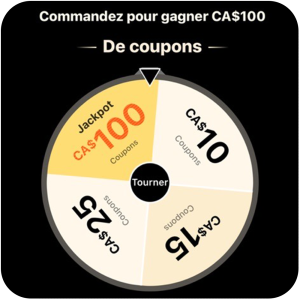Temu, an online shopping app experiencing rapid popularity, stands out with its playful and engaging approach. Instead of simply browsing to find a product, Temu users often find themselves participating in games like wheel spins, opening “mystery boxes,” or being offered limited-time promotions that seem hard to resist. These features, inspired by both video games and gambling, encourage users to buy more, more often.
Temu: The (False) Promise of a Jackpot?
What is Temu?
Launched in Canada in February 2023, Temu quickly captured market share in the online shopping industry, notably by flooding social media with ads and recruiting influencers on platforms like TikTok. With its slogan “Shop Like a Billionaire,” Temu relies on ultra-low prices and generous discounts on an almost endless array of products. Electric razors, sports shoes, kitchen knives, drones, smartphones… there’s hardly anything you won’t find on Temu. If you’re looking for a mini crossbow or even a “portable lung capacity trainer,” you’ll find them on the platform.

While Temu resembles other platforms that preceded it, such as Wish, AliExpress, or Shein for clothing, the app stands out for its model that is heavily inspired by gambling. And just like in gambling, customers on Temu don’t always come out as winners.
Turning Shopping into an Irresistible Game
Temu uses several techniques stemming from gamification and gambling to keep users engaged and stimulate their desire to buy:
Gamification
Temu integrates numerous game-like elements into the shopping experience. Users can earn rewards, like points or discounts, after completing specific actions such as playing mini-games, sharing the app with friends, or reaching certain purchasing thresholds. This approach transforms the shopping experience into a sort of challenge where users progress and earn “rewards,” a strategy clearly inspired by video games.
Random Reward System
Similar to “loot boxes” in video games or jackpots in gambling, random rewards create anticipation and have an element of surprise, a combination that has addictive effects. Users don’t know what type of reward they’ll get or when they’ll get it, which prompts them to keep clicking in hopes of landing increasingly enticing rewards.
In an article published in April 2024 on the BBC website titled “Temu is as addictive as sugar: How the ecommerce retailer drives a shopping frenzy”, Mark Griffiths, professor of behavioural addiction at Nottingham Trent University (UK), explains: “They’ve mixed shopping and gamification really well. Temu’s marketing strategy means you are literally having to browse to get your rewards.”

Wheel Spins and Mystery Boxes
Directly reminiscent of online casino games, these features tap into user curiosity and excitement. By spinning a wheel or opening a mystery box, users can obtain random rewards, like discounts or exclusive offers.
A Real Risk of Addiction
The gaming mechanisms implemented on Temu can alter users’ perceptions and behaviours towards online shopping.
The excitement linked to the uncertainty of rewards triggers dopamine release, a neurotransmitter associated with pleasure. This positive reinforcement mechanism encourages users to repeat actions to re-experience the satisfaction. Adding time-limited promotions, notifications, and other pressure tactics (“Almost sold out!”), the app creates a sense of urgency, pushing users to buy products they hadn’t planned on.

For some users, connecting to Temu, spinning the wheel, or opening mystery boxes can become a habit that’s hard to control. This is a process exploited by many gaming apps, designed to get users to log in regularly to avoid losing benefits or missing out on rewards. Temu goes a step further, incorporating games like Fishland and Farmland into its business model, where users raise fish in one and manage a farm in the other, earning free products or Temu credits as they progress. To reach these goals, users are encouraged to log in daily and even reach out to their network. The Facebook group Temu Addicts Anonymous and its numerous daily posts vividly illustrate the urgency felt by many users, begging strangers to accept their invitations to win prizes.
A Misleading Strategy?
It doesn’t take heavy use to see this in action: when a wheel appears on the screen offering a chance to win either $100, $25, $15, or $10 in coupons, you will often hit the jackpot: $100 in coupons. Then, another wheel appears, offering to double your prize. Have you suddenly become exceptionally lucky?
Not really. These rewards often come with conditions designed to make you spend more. This animation, The Psychology of Temu’s Casino-Like Shopping UX perfectly illustrates how Temu’s strategy works from the first interactions with the app:
- Step 1: A wheel appears. You want to spin it, but you need to register.
- Step 2: As you hesitate, a welcome bonus of $50 pops up: register to claim it.
- Step 3: After registration, you return to the wheel, spin, and win $100 in coupons. But you discover that you need to buy 20 items to use it. That’s not all: you have 4 hours to do so, and a timer stays on the screen.
- Step 4: As you continue on the platform, surprise: the $100 coupon is divided into six coupons of different amounts, each with a minimum purchase requirement.

After going through these steps, you realize that to benefit from your $100, you’ll need to spend $450. You may not do it, but you’re now registered, with access to thousands of unbeatable-priced products, each with enticing details like “Almost sold out,” “18,000+ sales,” “X just bought it,” “Only 1 left,” often accompanied by a countdown timer. Resisting the temptation then becomes challenging. And if you have a history of gambling, Temu’s environment might trigger some familiar urges.

These methods, also known as “dark patterns,” are widely controversial and currently the subject of multiple consumer complaints in Europe.
Note: Temu is facing numerous controversies worldwide. Several countries have accused it of espionage on behalf of the Chinese state, hidden forced labour, sale of dangerous goods, as well as unfair competition and deceptive practices.
Online shopping platform, video game, casino: with an intense blend of elements, Temu combines numerous ingredients that may lead to loss of control, be it through compulsive shopping or even addiction.
If you feel you’re losing control, it’s essential to seek help before this engaging experience turns into a real issue, with all the consequences it implies.
To speak with a counsellor, reach out via chat on the bottom right of the screen or by phone at 1-800-461-0140.
Ce contenu a été traduit grâce au soutien du Secrétariat aux relations avec les Québécois d’expression anglaise.
